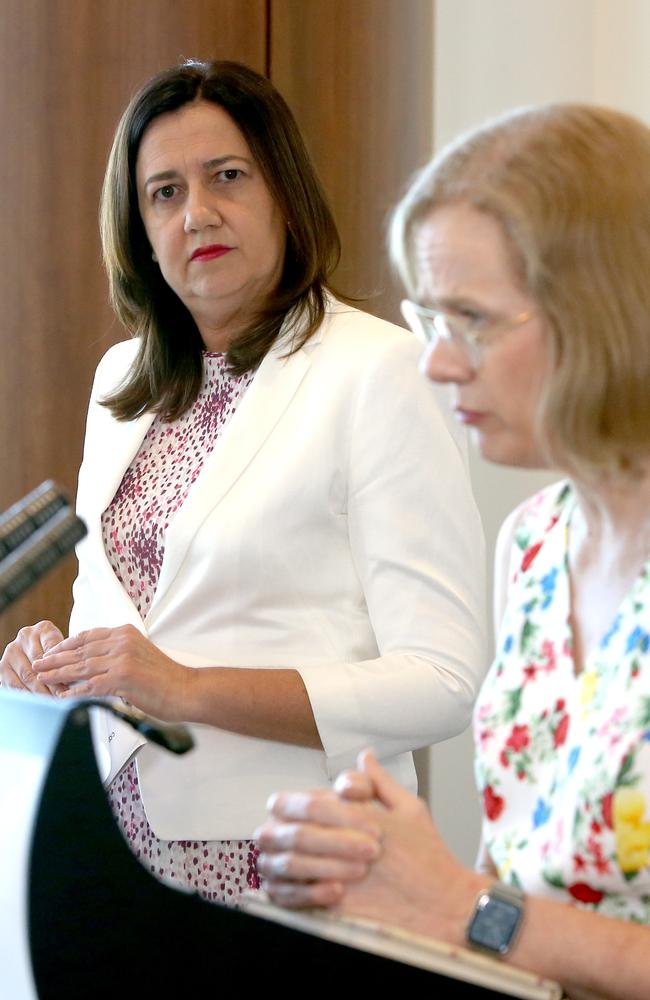Mike O’Connor: English a casualty as gibberish takes over
It’s been a tough few weeks for the English language - just ask Annastacia Palaszczuk and Jeannette Young, writes Mike O’Connor.
It’s been a tough few weeks for the English language as it has repeatedly failed to do what it is designed to do, which is to facilitate communication between one party and another.
It let Premier Annastacia Palaszczuk down pre-Olympics when she used it to repeatedly claim that there was no way she would be attending the opening ceremony. She had obviously meant to say that she would not be attending it unless she allowed Australian Olympics boss John Coates to coerce her into doing so in front of several million people.
It also singularly failed to adequately communicate what chief health officer Jeannette Young meant when she said that there would absolutely be no football games played in southeast Queensland during the current lockdown.
“There will be no football,” she said when what she really meant to say was that there would be no football unless the head of the NRL called the Premier and pointed out how much money was involved with sponsors and broadcast rights.
Those people left wondering why it is acceptable for 26 men to wrestle each other for 80 minutes on a football field while a gathering of 11 people with each standing 1.5m apart and silently mourning the passing of a loved one at a funeral is banned should blame the English language for not adequately conveying the understanding that when the CHO says something will not happen, she means it depends on how much money is involved.

Similar problems confronted Health Minister Yvette D’Ath when she announced that seven new hospitals would be built.
Once again the English language failed to convey that what the minister meant was that they wouldn’t really be hospitals, mainly because they would not contain those features that one would normally associate with hospitals such as emergency departments, beds and operating theatres.
They would, in fact, be health centres, but would most assuredly feature chairs. It’s the fault of the language, plainly, to adequately convey what the Minister meant to say.
Deputy Police Commissioner Steve Gollschewski, a permanent prop at all Covid-related media conferences, which generally have nothing to do with the police service, was let down by the language over the weekend when adopting his Very Serious Policeman’s expression, he warned Queenslanders that anyone leaving their homes should carry identification.
Surely what he meant to say was that there is no legal requirement for any Queenslander to carry personal identification before they can venture on to the street because we don’t live in a totalitarian police state.
If, however, people would oblige the police service by doing so, that would be appreciated, but there was absolutely no obligation to do so.
If you want to get people on side, one way of ensuring that you fail in this endeavour is to use language designed to intimidate them.
The language also failed the Australian Technical Advisory Group on Immunisation when it warned people under the age of 40 against getting the AstraZeneca vaccine.
What ATAGI meant to say was that if there’s an outbreak then everyone should access whatever is available as quickly as possible. Now that this has occurred, it is modifying its language accordingly, having previously frightened people into avoiding AZ.
Professor Kristine Macartney, a member of ATAGI, is now urging anyone in Sydney to “strongly consider” getting the AstraZeneca vaccine. The language, not incompetence, surely is to blame.
You and I don’t have any trouble communicating with each other.
If I say “I will meet you at the Breakfast Creek Hotel at 1pm tomorrow”, I don’t mean that I will meet you there unless I get a better offer, in which case I will later claim that when I said “would” I meant that I ”might”, reserving my right to alter my plans in the light of changing circumstances. But then we’re not in politics.
The English language when properly employed can be a wonderfully descriptive means of communication, but for it to be truly effective, it requires people employing it to say what they mean and mean what they say.



